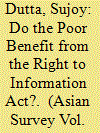| Srl | Item |
| 1 |
ID:
185982


|
|
|
|
|
| Summary/Abstract |
I investigate to what extent India’s Right to Information Act is useful for poor households. Drawing on empirical data from central Uttar Pradesh, I study two categories of poor households—urban and rural—possessing Below Poverty Line cards. These cards entitle their holders to several subsidies, but they are poorly targeted: certain communities receive more cards, while most of the deserving poor do not receive them. The Act is meant to create space for democratization, enabling the poor to challenge local power holders; but there are obstacles to their taking advantage of it. They are scarcely educated, and unaware of the Act, and they get no support from government agencies responsible for implementing it. This has encouraged the use of manipulative tactics by local representatives and government bureaucrats seeking power, control, and domination. But the poor do find ways to receive their entitlements.
|
|
|
|
|
|
|
|
|
|
|
|
|
|
|
|
| 2 |
ID:
096661


|
|
|
|
|
| Publication |
2010.
|
| Summary/Abstract |
This article has two objectives. First, it interrogates the normative understanding of the identification of poor people as a technical process confined to the domain of experts. The paper analyses the construction of Below Poverty Line (bpl) status in India, and provides evidence for how this is contested at multiple levels of the policy process, through both formal and informal policy practices. Second, the paper uses a case study of a major anti-poverty policy, the Suvarnajayanti Gram Swarozgar Yojana, to demonstrate how the cumulative outcome of formal and informal policy practices is the erosion of the redistributive intent of policy. The paper emphasises the importance of foregrounding within policy discourse the politically contested nature of the processes of identifying poor people, and of determining their eligibility for anti-poverty policy resources. The typology of policy practices generated calls for deeper recognition of the significant influence of informal policy practices on the policy process in India.
|
|
|
|
|
|
|
|
|
|
|
|
|
|
|
|